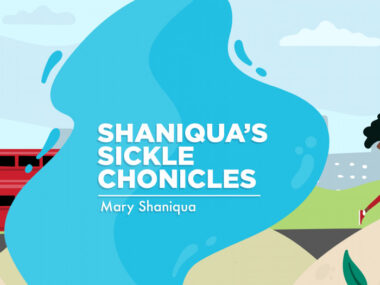The challenges of navigating a sickle cell pain crisis in public
My painful reality is not the 'entertainment' of the day
Written by |

Sickle cell disease is a constant, annoying “companion” in my life. My list of grievances about the illness is never-ending, but one of the things I find most daunting is the disease’s unpredictable nature. There’s almost no way to know when a sickle cell pain crisis will strike.
Unfortunately, this results in challenges such as having a crisis in public. The lack of control I have over my body makes me feel vulnerable and helpless, and the difficulty is compounded by the excruciating pain of a crisis. The uncertainty can be infuriating.
Honestly, I hate it. I find it so embarrassing.
I’m not embarrassed to have the illness, but rather to have my vulnerabilities on display for strangers to see, as though my life were some sort of soap opera.
Navigating a crisis can be extremely painful and traumatic, even at home. Having one in public adds a layer of discomfort and anxiety.
The negative experiences
Whether at work, in a store, or at a social gathering, the sudden onset of a crisis isn’t something I can control. I might look perfectly fine one moment, and the next, I’m incapacitated by pain, unable to do anything besides scream, cry, and desperately try to find a comfortable position while hiding myself.
I’ve had a lot of crises. I’ve had them on public transport, mid-flight, at all levels of schooling, in the workplace, and on days out. Just thinking about those experiences fills me with dread. I consider the sheer number of people for whom my reality might’ve been the “entertainment” of the day — the number of people I’d never be able to identify or recognize who have seen me at my weakest and most vulnerable.
Unfortunately for those of us with sickle cell, everyone seems to love a show.
I’ve seen people stare and point. They’ve made all sorts of unfair presumptions about me. They’ve laughed and joked at my expense. They’ve glared at me in confusion, not knowing what’s happening. Despite my angst, they can’t stop staring.
As a result, every time I feel a crisis coming on when I’m out, my mind races. How many people can see me? What will they say or do to me this time? I try to block out the glares and stares and protect my dignity by keeping my face hidden. I not only have to endure a sickle cell pain crisis, but I must also face my own discomfort and other people’s reactions.
The positive experiences
Despite the challenges of public crises, I’d be remiss if I didn’t also mention people’s kindness. Amid my countless negative experiences, there have been positive ones.
I’ve been fortunate to encounter compassionate people who, despite not knowing me well or even at all, saw me struggling and intervened to help and comfort me. Whether someone is trying to find space to make me as comfortable as possible, calling an ambulance and staying with me, protecting my dignity by creating a barrier, or simply holding my hands and wiping my tears, these acts of kindness have had a profound impact on me.
I’ve learned that, in those situations, the kindness of others can make all the difference. These interactions — seemingly small but extremely meaningful — have been my saving grace during some of my hardest and most embarrassing moments. I want to take this opportunity to thank those people. Thank you for your care, consideration, and empathy. Thank you to those who have been that kind stranger to other sickle cell patients, too.
It’s not always easy to know how to help when you witness someone in pain. But your willingness to offer support, overcoming any initial awkwardness or confusion, is truly amazing. You may never fully understand the impact of your actions, but you have made a world of difference. As I continue navigating the unpredictable nature of my illness, your actions remind me that wider society is not devoid of goodness.
I truly hope that God sends you comfort and kindness when you need it the most, just like you did for me.
We should all strive to be better. Next time you’re out and about and see someone having a difficult moment — perhaps due to pain or another health issue — I challenge us all to extend kindness and compassion. Take a brief moment to remember that this is their reality, and consider the impact of that. Let’s do what we can to protect their privacy and dignity and help in any way that we can.
Note: Sickle Cell Disease News is strictly a news and information website about the disease. It does not provide medical advice, diagnosis, or treatment. This content is not intended to be a substitute for professional medical advice, diagnosis, or treatment. Always seek the advice of your physician or other qualified health provider with any questions you may have regarding a medical condition. Never disregard professional medical advice or delay in seeking it because of something you have read on this website. The opinions expressed in this column are not those of Sickle Cell Disease News or its parent company, Bionews, and are intended to spark discussion about issues pertaining to sickle cell disease.



Tyrone Hodge
Shaniqua, what are your thoughts on Pfizer pulling Oxbryta from the market? What are some of the repercussions? My wife took it for over two years, and all of a sudden, our pharmacy notified us they'd no longer be carrying it.